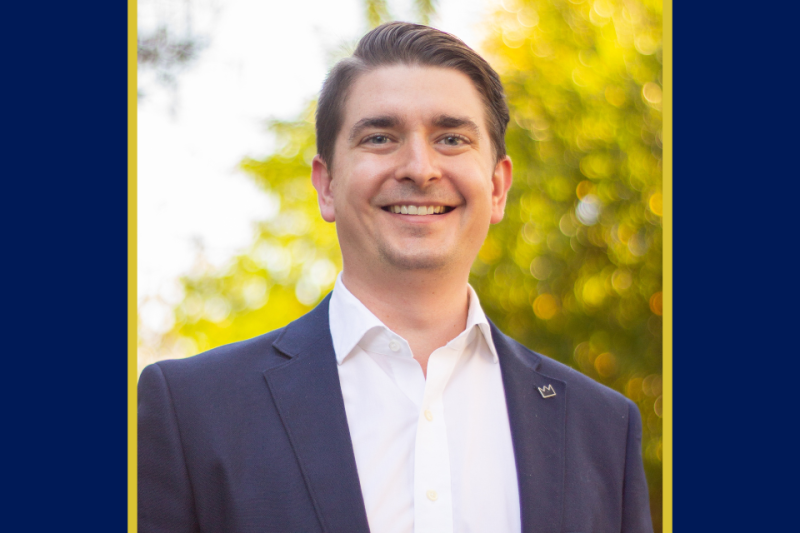
Cameron Strong’s advice to prospective and current trainees, regardless of their specialty, is to keep an open mind. He believes taking advantage of a variety of opportunities, even if they don’t seem directly related to their future plans, can help trainees grow as people and as clinicians. It’s an approach he takes to heart, and if he hadn’t followed his own counsel, today he’d be performing endoscopies instead of psychiatric evaluations.
For his first few years as a medical student at Baylor College of Medicine, Strong—now a fifth-year internal medicine-psychiatry resident at Duke—was set on becoming a gastroenterologist. But during the psychiatry rotation in his third year, that plan began to evolve. “I was drawn to patient care in the psychiatry emergency department as well as the inpatient units,” he reflected. “I found the patient interviews and rapidly changing clinical courses really interesting.”
At the time, he wasn’t aware of the internal medicine-psychiatry, or “med-psych,” residency option. After attending the national Association of Medicine and Psychiatry conference in 2017, where he met med-psych residency program director Jane Gagliardi, MD, MHS, and other Duke faculty members with both medicine and psychiatry training, he decided to pursue that path—and he hasn’t looked back.
“I enjoy combining aspects of internal medicine and psychiatry together, because you get to learn two different ways of thinking about the same patient, and that has proven very useful, whether you’re on the medicine side or the psychiatry side,” he said.
For people with serious health conditions, Strong explains, certain aspects of their illness, as well as their frequent contact with the medical system, may lead to emotional distress. For example, when talking with a patient with diabetes, he may discover that their challenges with managing their disease may be related to undisclosed depression or anxiety. “As a psychiatrist,” he noted, “I like to think that I could potentially help someone in that situation in a different way than someone who may not have the training to be able to unearth some of those aspects.”
Through the med-psych program, residents gain in-depth experience in caring for acutely ill patients, understanding the interplay between different organ systems, and learning how different medications interact with each other.
Leading in Residency and Beyond
The program has also afforded Strong valuable leadership opportunities. Last year, he served as a consult-liaison service co-chief resident, and this year, he’s one of two med-psych program chief residents. In any given week, these roles have him shifting from clinical tasks to administrative tasks, including trouble shooting, conflict resolution, conference hosting, and scheduling.
He also holds several broader institutional leadership roles. At the start of the pandemic, he and two pediatric residents co-founded the Housestaff Association for Sexual and Gender Diversity to increase visibility for LGBTQ trainees and promote diversity across Duke and among prospective trainees. He currently leads the group.
“We’ve had a lot of success with hosting social events, increasing our visibility, and promoting our aims in partnership with different health system affinity groups,” he reflected. “It’s certainly been challenging, but I’ve learned a lot.”
Strong also chairs the Graduate Medical Education (GME) Residency Council, in which he represents other residents and fellows across all GME training programs. In this role, he meets regularly with the GME directors to raise issues, determine their scope, and strategize how to resolve them.
One of his goals as chair is to increase transparency around decision-making. “Putting on my psychiatrist hat, two main drivers of anxiety are uncertainty and lack of control, and as a trainee, there can be a lot of uncertainty and not much control over your situation,” he noted. “I think people will be happier with decisions that are out of their control if they have more information about how those decisions are made.”
He says chairing the GME Residency Council has taught him about the challenges of navigating a large institution and helped him understand that there are many different demands from different sides.
Intense but Supportive
As he reflects on his nearly five years of training at Duke, Strong appreciates the depth of support he’s received throughout the program from co-residents, faculty members, department leaders, and administrators. “Duke has a reputation of being a pretty intense training program,” he explained. “We do treat a lot of very sick people here, and the expectations are really high, but I was surprised by how supported I felt and how open and welcoming the culture is.”
He has also been struck by the breadth of interesting opportunities Duke offers to trainees, such as the inpatient medicine-psychiatry service, correctional psychiatry at the Durham County Detention Facility, and electroconvulsive therapy. And Strong has found that if a trainee is seeking an opportunity that isn’t readily available at Duke, they’ll likely get support and encouragement from faculty members to create it themselves.

Although the rigorous program keeps Strong extremely busy, he’s been able to balance the demands of work with time for recreation and relaxation. He and his partner, Zach, a pediatric hospitalist at Moses Cone Memorial Hospital, love to travel, whether that’s exploring another country or taking a road trip across the state. When they’re not driving or flying to a new destination, you can find them hiking or doing other outdoor activities, exploring local festivals, hanging out with friends, or eating Tex-Mex.
Looking to the Future
After graduating, Strong hopes to work in an academic setting where he can practice medicine and psychiatry as part of an inpatient team, providing clinical care and training medical students, residents, and fellows.
Over the course of residency, he has developed an interest in consult-liaison psychiatry—that is, providing psychiatric care to patients who are admitted to the hospital for serious medical problems and collaborating with their non-psychiatric care teams.
“Psychiatry can be isolating. In a lot of roles, it’s just you,” he reflected. “But on inpatient services, you get to work with other people and collaborate and exchange ideas, and that’s one of the main things that drew me to medicine and psychiatry in the first place.”